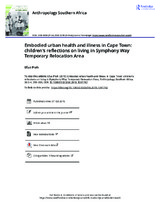| dc.contributor.author | Prah, Efua | |
| dc.date.accessioned | 2021-09-13T11:14:03Z | |
| dc.date.available | 2021-09-13T11:14:03Z | |
| dc.date.issued | 2015 | |
| dc.identifier.citation | Prah, E. (2015). Embodied urban health and illness in Cape Town: Children’s reflections on living in Symphony Way temporary relocation area. Anthropology Southern Africa,38(3&4), 269–283. http://dx.doi.org/10.1080/23323256.2015.1091742 | en_US |
| dc.identifier.issn | 2332-3264 | |
| dc.identifier.uri | https://doi.org/10.1080/23323256.2015.1091742 | |
| dc.identifier.uri | http://hdl.handle.net/10566/6649 | |
| dc.description.abstract | This paper explores ideas about health and illness held by six children who live in the
Symphony Way Temporary Relocation Area in Cape Town, South Africa. The research shows
that solutions to illness and health problems held by low-income populations are critically
shaped by various characteristics of society — the surrounding neighbourhood, the family and
the experience of the individual child. This contests current policy assumptions that solutions
to wellness are not located within the lived experience of local populations. The findings are
part of continued efforts to investigate how health is negotiated in low-income areas, what
challenges people face and how they overcome such challenges. The research discusses ideas
of health embodiment in relation to both the socio-economic and natural environment, and
illustrates the impact that poor housing-quality and access to health care services have on health
and ideas of health and illness. | en_US |
| dc.language.iso | en | en_US |
| dc.publisher | National Inquiry Services Centre | en_US |
| dc.subject | Children | en_US |
| dc.subject | Embodiment of health and illness | en_US |
| dc.subject | Health | en_US |
| dc.subject | Housing quality | en_US |
| dc.subject | Low-income areas | en_US |
| dc.title | Embodied urban health and illness in Cape Town: Children’s reflections on living in Symphony Way temporary relocation area | en_US |
| dc.type | Article | en_US |

